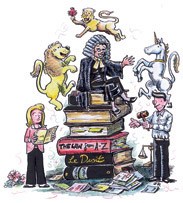Big ideas, mini courses
This October, McGill will begin laying down the law to hundreds of people in the Montreal community. For eight weeks in the fall, the Moot Court will be hosting a series of lectures known as Mini-Law. Modelled after its wildly successful counter-part in the Faculty of Medicine, Mini-Law represents an opportunity for the general public to hear top scholars speak on a range of legal topics, such as family law, contracts and human rights.

Jack Ruttan
"We're really looking at this as an outreach venture," says Rosalie Jukier, who is one of the organizers and an associate dean in the Faculty of Law. "Community outreach has long been one of the missions of a university and one of the goals of our faculty."
Participants can look forward to eight evenings that will feature refreshments, question-and-answer sessions and an opportunity to meet and listen to some of Canada's most prominent legal scholars. Among those speaking will be the dean of the faculty, Nicholas Kasirer, and his predecessors, professors Stephen Toope and Rod Macdonald. A place in Mini-Law is available for only a nominal fee, and a portion of the available seats will be reserved for seniors and high-school and CEGEP students.
Organizers anticipate that marketing the event will be no trouble. "Our problem will be filling it too fast," predicts Jukier. "The word is out somehow, and we're getting calls already."
The genesis of Mini-Law came about in the dining room of Kappy Flanders, a member of the school's Board of Governors. A dinner party hosted by Flanders brought together Dean Kasirer and his counterpart in the Faculty of Medicine, Abraham Fuks. During the course of the evening, conversation turned to the success of Mini-Med and, as Flanders explains, "pretty soon people were throwing out titles" regarding a lecture series in the Faculty of Law.
It was Flanders who first brought to McGill the idea for a series of medical lectures directed at the community. Hearing of the concept while visiting Ireland six years ago, she made further inquiries and learned that it was started in Colorado by a McGill alumnus and has been spreading to numerous American locales by means of a manual ("Americans do everything with manuals").
Flanders has a snappy sense of humour and a touch of pepper on her tongue, and one suspects that she had little trouble persuading McGill to create a Mini-Med of its own. The first series of lectures enjoyed roaring popularity and has since produced over 1,900 "graduates" of every description, including the spouses of Principals Shapiro and Munroe-Blum, and "crazy people who arrive at 4:30 for a 6:30 lecture."
The inaugural Mini-Law series will be offered on consecutive Thursday evenings, and will take place on a corresponding time-line as the Wednesday night Mini-Meds, which will be entering their fifth year. Expectations are high, and Jukier and her colleagues are looking forward to the culmination of a planning stage that has entailed "enormous energy, time and imagination." Her efforts are enjoying the support of the McGill Alumni Association as well as that of Davies Ward Phillips and Vineberg, a Montreal law firm.
Flanders too carries a sense of anticipation regarding Mini-Law. She declares that she is looking forward to this new opportunity to bridge the "separation of town and gown" through a project that's both "a good outreach proposition for McGill and a good community builder."
Want to learn more about the upcoming Mini-Law series? Phone 398-7276 or email mini.law-@mcgill.ca. Mini-Law's website will be launched in the coming months.
